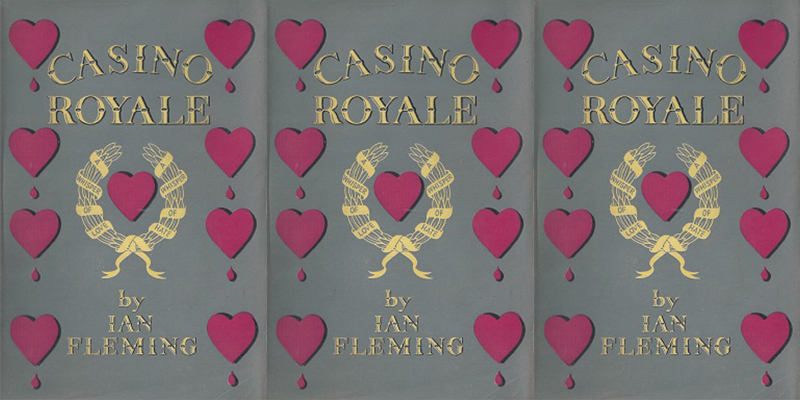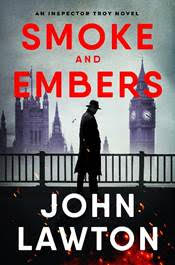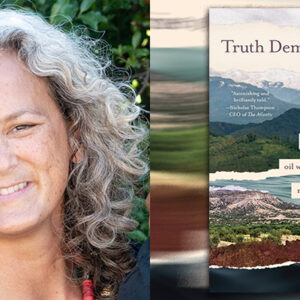2025 will be the last year of the Bristol Crimefest — 15 years of what one English newspaper described as ‘the friendliest of festivals.’ Among the guests of honour will be the Cornwell brothers, sons of John le Carré, one of whom (under the nom de plume of Nick Harkaway) is continuing the character George Smiley.
Two years ago the same slot at the fesitval went to the heirs of Ian Fleming. Now, I am told, even in print, that I can be a bit of a churl and for reasons I can no longer remember I did not attend; hence I will not attempt to quote or paraphrase anything said on that occasion. Yet … and yet … that event, bolstered by the upcoming 2025 event, keeps prompting me to wonder what I really think of the much vaunted terms ‘heritage’ and ‘legacy.’ Name me an American president of late who has not worried about his ‘legacy’. In the last week Pope Francis’s legacy has been aired repeatedly, probably in every newspaper on earth. My dad’s legacy, some sixty-odd years ago, was a pair of shoes that didn’t fit me, an unpaid bill for piano lessons and a photo-album of his time in Hitler’s Germany — the latter, I freely admit, an influence and an inspiration. I have not yet paid for the piano lessons.
Smiley’s ‘legacy’? Call for the Dead (the first to feature GS, I think) is one of my favourite novels. I could take more, and so it seems could England — Nick Harkaway’s Karla’s Choice has been very well received.
Bond’s ‘legacy’? Tricky. I read them all at the right age (17) and umpty years later find I have very mixed feelings. One of my first memories of James Bond is sitting outside a pub in Dublin (as the Dad necked a pint) reading a newspaper condemnation of the filming or Dr No in 1961 — readers were urged to reject Bond as ‘pornography’, referring to the bollock-beating Bond suffers at the hands of Le Chiffre. Alas they cited the wrong book — that scene is in Casino Royale not Dr. No and did not grace/pollute the silver screen for another forty-five years.
But … it pinpoints a regular elision. At seventeen skool put me in a civics class — foreseeing that some of us were about to desert the summer of love to become the rebels of ’68 they made a last ditch attempt to mould us into good citizens. Tough. Sysyphean.
Each surly brat was asked to deliver an appraisal of a writer they liked. One chose Fleming. I gave him three or four minutes before I interrupted.
“Mike, have you actually read any of Ian Fleming’s books?”
“What?”
“Because it seems to me you’re describing the films not the books. You refer to Bond as ‘the man every man wishes he could be.’ Do you honestly want your bollocks beaten raw … do you want your girlfriends to kill themselves? James Bond is an habitual loser, for every triumph he pays a price in personal loss.”
Amidst the chorus of denial I was chucked out for the ‘bollocks’ and ordered to recite eight million Hail Marys, so I never knew where the debate ended. The closest I got was a kid who accosted me in the seniors’ quadrangle the following day to tell me I was a ‘fukkin nutter.’
A year or two later the first legacy Bond book appeared, Colonel Sun by Robert Markham, a one-off pen name for Kingsley Amis. It wasn’t good. Almost simultaneously Amis published his study of Bond, The James Bond Dossier. Now, that was good. You can learn a lot reading it even today.
Thereafter it seems the legacy novels were almost always eclipsed by the films. John Gardner wrote more Bonds than I can count, certainly more than a dozen, and the Roger Moore films were churned out with an alarming regularity if only to use up the stack of safari suits in Pinewood’s wardrobe that happened to be his size. They are all forgettable. They were not the Bond of the novels. Nor even the Bond of the early films. When Sir Roger retired I hoped Eon would call it a day. They got lucky, Tim Dalton finally signed on the dotted line. Suddenly with The Living Daylights the franchise was alive again. Fukkit, spoke too soon. The second Dalton film might just be the worst Bond film ever made, eclipsing even the execrable No Time to Die.
Skip a few years. Eighteen to be precise. John Gardner’s last Bond appears in 1996, and in 2008 on the hundredth anniversary of Fleming’s birth, the books are relaunched with Devil May Care by Sebastian Faulks. It was an intriguing idea — ask prominent writers, often literati rather than crime and espiongage specialists, to pick up the mantle. It worked.
In 2015 Trigger Mortis (great title) by Anthony Horowitz came out. Anthony is quite possibly the most prolific current writer of crime. Was I alone of seeing a touch of PC? I aired this, to not much reaction, at Bouchercon Toronto a year or so later. Yet the doubt still nags.
Bond is a misogynist dinosaur. In what I take to be ‘heading the critics off at the pass’, Judi Dench’s M says that to Pierce Brosnan’s Bond in their first film together. It changed nothing.
So … at last to the point … where is the franchise going … and, just possibly, why? And why ask now?
Two reasons.
1 : Amazon just bought the film franchise for a fortune.
2 : Fleming died in 1964. Under the terms of the revised Berne convention, for all countries that are signatories, the Bond books will enter the public domain in 2034/5. In media terms … that’s about 15 seconds.
The opportunities for speculation are almost endless.
Will the literati books continue after 2035 … alongside the zillion other efforts that will surely take advantage of the end of copyright? Will Bond free-for-alls see 007 in sci-fi, porn or giving online cookery lessons with our dreadful Duchess?
(Helpful hints # 37 : Anyone wishing to set up a franchise would be well-advised to study the British Royal Family.)
What will Amazon do in the eleven years of outright exclusive that remain? A film a year? Part of the Bond phenomenon has always been the waiting, the anticipation, the cinematic tease so neatly captured in the trailer for Goldeneye, the first Brosnan film — “You were expecting someone else?” A 52 part TV series streamed not released to cinema? Whaddafukk? You mean I’d finally have get a Netflix/Prime/Bookface/X/TukTuk/WakWak subscription? Ye gods and little fishes. Bear in mind that all this is happening with no one yet cast to replace Daniel Craig … and a long history of the English resisting Bond being played by anyone other than an Englishman. Who would I like to see play Bond next? Sorry, life is too short to give that question a nanosecond’s headroom.
I don’t know, but … yep, there’s always a but … but …
I think it a waste of time to update Bond. A PC Bond is no Bond at all. He is as Fleming made him. In all his nastiness, violence, misogyny and, as Amis asserted, racism … ‘who else would be snobby enough to draw a distinction between a plains Cretan and a mountain Cretan?’ (I paraphrase, of course.) As soon make Macbeth into a good guy. As soon redeem Bill Sikes.
I’m not agin franchised sequels per se … Marjorie Allingham is continued by Mike Ripley, seamlessly. The great (nah … the greatest) Robert B. Parker continued by no less than a writer than Reed Farrel Coleman. It can and does work — but I fear it won’t work with Bond any longer.
I think JB was ‘born’ circa 1920. He may be an author fantasy, Fleming being a much older man than his character. Bond lives the life that Fleming could not and had not? 1920 … that makes him … er … 105. Could I put in a plea here? Isn’t it time to kill the old bugger off? Rather than see Bond remoulded to fit the 21st century could he not simply be allowed to die?
If not, we will see him milked like the cash cow he surely is until excess extinguishes all interest. If I’m right about the direction I perceive we are in for a Bond glut, a Bond who will be politically correct, thereby ceasing to be Bond, and both films and books will be regarded as ‘product’ (a word I do not want to see within ten light years of my novels — same goes for ‘brand’) and might as well be stacked in supermarkets next to the corn flakes.
“The name’s Kellog, James Kellog.”
As they say in my native dialect, “Tha mun let t’owd bugger dee.”
***


















